
Patient Newsletters & Resources
Living with kidney disease brings many changes and challenges. The Heartland Headlines patient newsletter provides stories and ideas from people living well with kidney disease, as well as articles on treatment choices, quality of life topics, and services provided by the Network and Medicare. The Network also develops different resources, such as handouts, fliers or posters based on patient and facility feedback and CMS guidance to support renal patients.
Very Important Person: Peer-to-Peer Sharing Calls
We believe every patient should feel like a VIP—because everyone is a Very Important Patient. We also know that with all the options available and challenges that can come with being a dialysis patient that sometimes talking with another patient whose had similar experiences can be helpful. We welcome patients, family members and care partners to call in to listen and ask questions of patient peers about their experiences with a special call in series. It’s your opportunity to get information and advice from patient peers (from our Patient Advisory Council) to help consider different treatment options like home and transplant, using vocational rehabilitation services and staying infection free. Download and share the VIP Call In Series information.
Heartland Headlines – Patient Newsletter

- Heartland Headlines 2020 | Issue 2
- Heartland Headlines 2020 | Issue 1
- Heartland Headlines 2019 | Issue 2
- Heartland Headlines 2019 | Issue 1
- Heartland Headlines 2019 | Issue 1 (Spanish)
- Heartland Headlines 2018 | Issue 2
- Heartland Headlines 2018 | Issue 1
- Heartland Headlines Fall 2017
- Heartland Headlines Fall 2017 Recipe Edition
- Heartland Headlines Spring 2017
Interested in receiving a copy of the Heartland Headlines patient newsletter? Sign up here to be added to our email list.
Your Feedback is Important to Us! In order to continually improve the educational resources we develop, we want to hear from you. Please take a few minutes to share your thoughts on the Heartland Headlines newsletter by answering a few questions.
Medicare

- Dialysis Facility Compare
- Medicare.gov has created the Dialysis Facility Compare website to provide patients and family members with important information and resources for chronic kidney disease and dialysis.
- ESRD New Patient Orientation Packet
- All new dialysis patients receive the ESRD New Patient Orientation Packet from the ESRD National Coordinating Center. This packet is mailed directly to the patient after the Network receives and processes the CMS 2728 form. It contains valuable information and materials relevant to patient treatment and care.
- Medicare Part D
Fluid Control
Keeping the amount of fluid you put on between treatments is important. “Fluid overload” is when you have too much fluid in your body that causes shortness of breath, swelling, high blood pressure and excessive weight gain.
Fluid restriction may vary for each individual patient. Factors such as weight gain between treatments, urine output and swelling are considered. If you are on hemodialysis, your weight is recorded before and after your dialysis session
The goal for restricting your fluid is that you will feel better and stay healthy before, during and after treatment with no cramping or blood pressure fluctuation during dialysis treatment.
Tips on Controlling Thirst
Fluid control is not easy. Follow the mentioned tips to keep your thirst down, and talk with your dialysis team for support in helping you manage your fluids. Feeling better and staying healthy is the goal. Stay engaged and ask questions to help you achieve this goal.
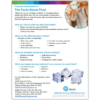
Download: The Facts About Fluid FAQ
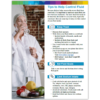
Download: Tips to Help Control Fluid
Transplant

The Transplant Experience
The Transplant Experience is a FREE program that can help you learn more about pre-transplant, living well with your transplant and planning ahead. By joining you receive:
- Welcome Kit: personal treatment journal, inspirational video, and medication organizer
- Regular Updates: quarterly newsletters, e-mails and videos, booklets on key topics, plus tools and advice for living healthy
You must be 18 years of age or older to join the Transplant Experience program.
Transplant Living
Transplant Living is a service of the United Network for Organ Sharing (UNOS).
(888) 894-6361
This resource offers information:
- Before the Transplant includes articles on topics such as: Organ Facts, Waiting for Transplant, and Financing a Transplant
- Community includes information on Support Groups, Patient Resources and Stories of Hope
- After the Transplant includes information on Recovery Resources, Lifestyle Changes and Medications
- Pediatric includes information to Help Your Child Adjust, Addressing Their Needs and Coping With Anxiety
- Living Donation includes Facts, Types, How to become a donor, and Financing Living Donation
Medication & Financial Assistance Programs
The application process, criteria, funding amounts and availability vary for each program. More programs may be available in your area, ask your clinic Social Worker for more information.
The American Kidney Fund
- Information on Kidney Disease and Treatment Options
- Patient Assistance Programs: Patient Services department 1-800-638-8299
- Help with health insurance premiums and treatment-related expenses
- Talk with your social worker to apply for these programs
- A HelpLine 866-300-2900 (Se habla Español)
- Programs for Children (Summer Enrichment and Calendar Kids Art Contest)
Patient Access Network Foundation
The Patient Access Network Foundation (PAN) facilitates access to medical treatment for patients with chronic or life-threatening illness. PAN is dedicated to overcoming financial and other barriers to treatment, and works efficiently and collaboratively to help patients receive prescribed treatments and the care that best meets their needs. Since October 2004, PAN has awarded hundreds of millions of dollars in co-payment assistance to patients in need. www.panfoundation.org or 1-866-316-PANF (7263)
Needy Meds
Needy Meds, a non-profit organization, helps you find help with the cost of medicine. NeedyMeds’ mission is to be the best source of accurate, comprehensive and up-to-date information on programs that help people facing problems paying for medications and health care; to assist those in need in applying to programs; and to provide health-related education using innovative methods. www.needymeds.org
Healthwell Foundation
The HealthWell Foundation provides financial assistance to eligible individuals to cover coinsurance, copayments, health care premiums and deductibles for certain medications and therapies. If you’ve been prescribed a medication and your insurance company covers it, but you still cannot afford the coinsurance or copayment required, we may be able to help you by paying for part of your costs associated with the medication. Also, if you are eligible for health insurance, but cannot afford the insurance premium, we may be able to help with your insurance premium. www.healthwellfoundation.org or 800-675-8416
Dialysis Treatment
It is very important that you receive your full dialysis treatments as your doctor has prescribed. Coming for every treatment and staying for the full time is important to getting “adequate” dialysis. You may not think cutting treatment by 30 minutes or missing a treatment once a week makes a difference- but over time every minute adds up.

Download: Minutes Matter – Risks of Shortened or Missed Treatment
My Questions & Goals
MY QUESTIONS & GOALS is a trifold brochure-style resource with a checklist of statements and questions that patients can address with their care team, as well as some open ended questions to help patients set their own goals and determine what is most important to them. Patient experts have shared that they had a lot of questions when they began dialysis. They were so overwhelmed with the amount of information that they did not even know where to start or what to ask—this was the driving force for this patient checklist brochure.
Patient Subject Matter Experts (SME’s) and care partners also shared that many times lab numbers are not the first concern of a patient, but if staff can shift the focus to quality of life issues (having energy, feeling better, etc), then patients will be more receptive. Since the questions may be different for patient just starting dialysis and those who are “existing” patients there are two versions available.
Other Resources

Download: Patient Groups Resources

Download: Why am I Cold

Download: 10 Benefits of Vocational Rehabilitation
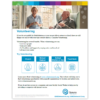
Download: Volunteering
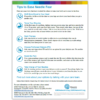
Download: Tips to Ease Needle Fear
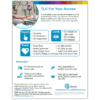
Download: TLC for Your Access
